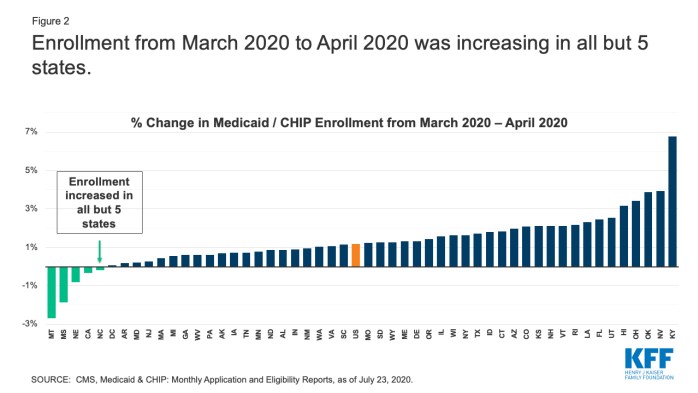Last Week in Coronavirus: July 24 to July 30
Published:
During the 28th week since the first coronavirus case appeared in the United States we also entered the final 100 days of a presidential election campaign that’s increasingly influenced by this pandemic. Last week, we released additional findings from our most recent KFF Health Tracking Poll, which found that voters’ approval of President Trump’s handling of the coronavirus has dropped 18 points to hit a new low. 61 percent disapprove of the President’s handling of the pandemic less than four months before the election, compared to 35 percent who approve.
Meanwhile, the gross domestic product for the second quarter in the United States contracted by the greatest rate on record. And Congress, which was working to pass the coronavirus relief bill and provide answers on whether the additional unemployment benefits would continue, recessed without resolution to that question as 1.43 million filed for unemployment last week.
The economic impact of the pandemic is reversing trends in Medicaid and the Children’s Health Insurance Program (CHIP) for 2020. After two years of declining enrollment, the number of people covered by Medicaid and CHIP rose by 1.2 million between Dec. 2019 and April 2020, to 72.3 million.
Last week the pandemic also unfortunately set records. Deaths due to COVID-19 in the United States crossed 150,000 on July 29 — 189 days since the first case in the U.S. We ended the week with a 7-day rolling average of 65,171 new cases per day nationwide as of Thursday, July 30. Meanwhile, the majority of the country is living in a hotspot. In that area the U.S. also crossed a threshold last week, hitting the highest number of hotspot states — 40 accounting for 80.8% of the US population – on Sunday, July 26.
As the pandemic continued to spread, the first schools started to reopen and others in the South and Midwest prepared for in-the-classroom education to start in August — even in some of these hotspot states. We compiled what is known and unknown about the risk of children transmitting and becoming infected with the novel coronavirus as schools prepare for fall in our new analysis.
Here are last week’s coronavirus stats from KFF’s tracking resources:
Global Cases and Deaths: Total cases worldwide reached 17.3 million on July 30 – with an increase of approximately 1.8 million new confirmed cases since July 23. There were also approximately 39,700 new confirmed deaths worldwide between July 23 and July 30, bringing the total to 673,200 confirmed deaths.
U.S. Cases and Deaths: Total confirmed cases in the U.S. passed 4.4 million last week. There was an approximate increase of 456,199 confirmed cases between July 23 and July 30. Approximately 7,625 confirmed deaths in the past week brought the total to 152,055 confirmed deaths in the U.S.
State Reports of Long-Term Care Facility Cases and Deaths Related to COVID-19 (Includes Washington D.C.) as of 7/30
- Data Reporting Status: 47 states are reporting COVID-19 data in long-term care facilities, 4 states are not reporting
- Long-term care facilities with known cases: 14,071 (across 44 states)
- Cases in long-term care facilities: 336,824 (across 43 states)
- Deaths in long-term care facilities: 62,925 (in 43 states)
- Long-term care facility cases as a share of total state cases: 9% (across 43 states)
- Long-term care facility deaths as a share of total state deaths: 44% (across 43 states)
State Social Distancing Actions that went in effect 7/24 to 7/30 (includes Washington D.C.):
- Face Mask Requirements
- New requirements: No states
- Enhanced requirements: MD, MS
- Social Distancing Measures
- Extended: AL, DE, SC, UT, IL, IA, MA, WA
- Paused: MD
- Rolled back: NV
- New restrictions: KY, DC, MS
THE LATEST KFF COVID-19 RESOURCES:
- What Do We Know About Children and Coronavirus Transmission? (News Release, Issue Brief)
- KFF Health Tracking Poll – July 2020: Coronavirus and the 2020 Election (Poll Findings)
- Growth in Medicaid MCO Enrollment during the COVID-19 Pandemic (Data Note)
- Analysis of Recent National Trends in Medicaid and CHIP Enrollment (Issue Brief)
- Updated: COVID-19 Coronavirus Tracker – Updated as of July 29 (Interactive)
- Updated: Medicaid Emergency Authority Tracker: Approved State Actions to Address COVID-19 (Interactive)
- Updated: State Data and Policy Actions to Address Coronavirus (Issue Brief)
- COVID-19 Pandemic Not Seasonal But ‘One Big Wave,’ WHO Says, Urging More Measures To Mitigate Spread As Some Reopened Countries Witness Rise In Cases (KFF Daily Global Health Policy Report)
THE LATEST KHN COVID-19 STORIES:
· The Color of COVID: Will Vaccine Trials Reflect America’s Diversity? (KHN, Los Angeles Times)
· Analysis: When Is a Coronavirus Test Not a Coronavirus Test? (KHN, New York Times)
· Public Health Experts Fear a Hasty FDA Signoff on Vaccine (KHN, Huffington Post)
· In Texas, More People Are Losing Their Health Insurance as COVID Cases Climb (KHN, NPR)
· Where Mask-Wearing Isn’t Gospel: Colorado Churches Grapple With Reopening (KHN, NBC News)
· Lost on the Frontline (KHN, The Guardian)
· Dental and Doctors’ Offices Still Struggling with COVID Job Loss (KHN)
· The COVID-19 Downturn Triggers Jump in Medicaid Enrollment (KHN)
· Last Thing Patients Need During Pandemic: Being Last to Know a Doctor Left Network (KHN)
· ‘It’s About Love and Solidarity’: Mutual Aid Unites NYC Neighbors Facing COVID (KHN, NPR)

